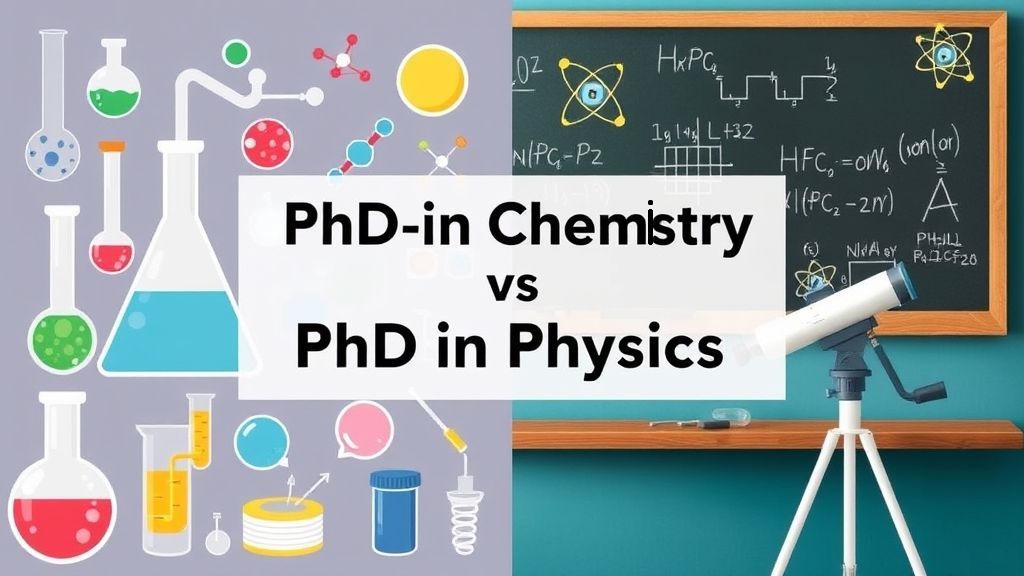PhD in Chemistry and Physics: Which Path Suits You?

Strong 8k brings an ultra-HD IPTV experience to your living room and your pocket.
Choosing the right field of study for a PhD can be a challenging decision, especially when there are numerous paths available. Two of the most fascinating and intellectually stimulating fields in science are PhD in Chemistry and PhD in Physics. While both branches focus on the study of natural phenomena, they explore different aspects of the physical world, offer diverse career opportunities, and require distinct approaches to research. In this blog, we will delve into both fields, comparing their focus areas, research domains, and potential career paths.
What is a PhD in Chemistry?
A PhD in Chemistry is a doctoral degree focused on the study of matter, its properties, reactions, and the processes that govern those reactions. Chemistry is often called the "central science" because it connects other natural sciences like biology, physics, and environmental science. A PhD in Chemistry typically covers a broad spectrum of topics, such as organic chemistry, inorganic chemistry, physical chemistry, analytical chemistry, and biochemistry.
Students pursuing a PhD in Chemistry often conduct experiments and work in laboratories to explore the chemical behavior of substances and how they interact with one another. This may involve synthesizing new compounds, studying reaction mechanisms, or analyzing materials' chemical structures to develop new products or processes.
Some common research areas within PhD in Chemistry include:
• Organic Chemistry: The study of carbon-based compounds and their reactions. Organic chemists often work in the pharmaceutical, petrochemical, and agricultural industries.
• Inorganic Chemistry: Focusing on non-carbon compounds, inorganic chemists study materials like metals, minerals, and catalysts used in industrial processes.
• Physical Chemistry: Combining principles of physics and chemistry, physical chemists study how matter behaves at the molecular and atomic levels.
• Analytical Chemistry: This area involves analyzing the composition of substances and detecting trace elements. Analytical chemistry is essential in fields like environmental testing and forensic science.
• Biochemistry: A field at the intersection of chemistry and biology, biochemists study the chemical processes within living organisms.
A PhD in Chemistry offers opportunities in various industries such as pharmaceuticals, environmental science, energy, and material science. Graduates typically become researchers, professors, or industry specialists working in labs to develop new products or improve existing processes.
What is a PhD in Physics?
A PhD in Physics is a doctoral degree that focuses on understanding the fundamental laws of nature. Physicists study a wide range of topics related to matter, energy, space, and time, with the aim of discovering how the universe works at its most basic level. The field of physics is vast and can be divided into several sub-disciplines, including classical mechanics, quantum mechanics, thermodynamics, electromagnetism, and astrophysics.
Students pursuing a PhD in Physics engage in advanced theoretical and experimental research. The goal is to uncover new principles of the physical world or to refine existing theories that help explain complex phenomena. Physicists often use mathematical models and computational simulations to predict the behavior of physical systems.
Some common research areas within PhD in Physics include:
• Quantum Mechanics: The study of the behavior of matter and energy at the smallest scales, often at the atomic or subatomic level.
• Astrophysics: The study of celestial bodies and the universe. Astrophysicists may research phenomena like black holes, dark matter, and cosmic radiation.
• Condensed Matter Physics: Focusing on the properties of solid and liquid matter, condensed matter physicists study things like superconductivity and nanotechnology.
• Particle Physics: Studying the fundamental particles that make up matter and how they interact. This field often involves large experiments, such as those conducted at particle accelerators.
• Theoretical Physics: Using mathematical models and abstractions to explain natural phenomena. Theoretical physicists work on topics like string theory, relativity, and quantum field theory.
A PhD in Physics opens doors to careers in academia, government research, technology development, and scientific consulting. Physicists can work in fields ranging from electronics and telecommunications to aerospace and energy production.
Key Differences between PhD in Chemistry and PhD in Physics
While PhD in Chemistry and PhD in Physics both focus on the natural sciences, they have distinct approaches, methods, and areas of study. Here are some of the key differences:
1. Focus Area: A PhD in Chemistry centers on understanding the chemical properties and reactions of matter, while a PhD in Physics focuses on the fundamental laws governing the physical universe.
2. Research Methods: In chemistry, research often involves lab-based experiments to synthesize new materials or understand chemical reactions. In contrast, physics research may involve both theoretical work, such as developing mathematical models, and experimental work, often in high-tech laboratories or large-scale scientific facilities.
3. Career Paths: Graduates of a PhD in Chemistry typically work in industries like pharmaceuticals, materials science, and environmental science, whereas those with a PhD in Physics may work in academia, government labs, or industries like aerospace, electronics, and energy.
4. Interdisciplinary Nature: Chemistry is considered a more interdisciplinary science because it overlaps with biology, environmental science, and materials science. On the other hand, physics is more focused on understanding the fundamental principles of nature, with applications ranging from electronics to cosmology.
5. Mathematics: Physics generally requires a more in-depth understanding of advanced mathematics, especially in areas like quantum mechanics or theoretical physics. Chemistry, while it involves math, tends to focus more on chemical equations, stoichiometry, and reaction kinetics.
Which Path Should You Choose?
Choosing between a PhD in Chemistry and a PhD in Physics depends on your interests, strengths, and career aspirations. If you are fascinated by the study of molecules, reactions, and materials, and want to work in industries like pharmaceuticals, environmental science, or energy, a PhD in Chemistry could be the best fit for you.
If you are more intrigued by the fundamental forces of nature and enjoy working with abstract concepts and mathematical models, a PhD in Physics might be the better choice. Physics offers a broader range of research topics, from the smallest particles to the vastness of space, and has applications in a variety of industries, including technology, engineering, and space exploration.
The Impact of Both PhDs
Both PhD in Chemistry and PhD in Physics play vital roles in advancing human knowledge and technology. Chemistry drives innovation in the development of new materials, drugs, and energy solutions, while physics provides the foundational principles that allow for technological advancements in fields like telecommunications, computing, and space exploration.
Graduates of both disciplines contribute to solving some of the world’s most pressing challenges, from creating sustainable energy sources to understanding the universe's mysteries. Whether through improving the chemical processes we rely on daily or uncovering the laws of the universe, a PhD in Chemistry or PhD in Physics equips individuals to make a meaningful impact on the world.
Conclusion
Both PhD in Chemistry and PhD in Physics offer opportunities for in-depth research and exciting career paths. While chemistry focuses on matter and its reactions, physics delves into the fundamental laws that govern the universe. Understanding the key differences between these two fields can help you make an informed decision about your academic and professional future.
Note: IndiBlogHub features both user-submitted and editorial content. We do not verify third-party contributions. Read our Disclaimer and Privacy Policyfor details.



